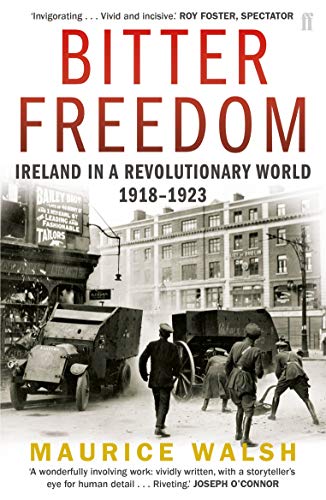
Bitter Freedom
by Maurice Walsh
"Ireland in a Revolutionary World 1918-1923"
Popularity
0 / 5
* A book's popularity is determined by how it compares to all other books on this website.
Where to buy?
Buy from Amazon* If you buy this book through the link above, we may receive a small commission at no extra cost to you.
Bitter Freedom by Maurice Walsh
Details
Perspective:
Researcher
True Story:
Yes
Biography:
No
Region:
Europe
Published Date:
2016
ISBN13:
9780571243013
Description
Main Themes and Topics
Maurice Walsh's Bitter Freedom delves into the epoch of the Irish revolution, offering an engrossing narrative that places Ireland’s turbulent quest for independence within the broader tapestry of early 20th-century global revolutions. The book meticulously examines the intertwining of local and global narratives, highlighting how Ireland's struggle reflected broader revolutionary movements around the world, notably in Europe and Asia. Walsh showcases how the emergence of new states and the reconfiguration of empires during this period echoed Ireland's fight for self-determination, turning its local events into a significant piece of a complex international puzzle.
Writing Style and Tone
Walsh writes with a historian's precision, yet his prose remains accessible and engaging for both academic readers and history enthusiasts. His narrative strikes a balance between detailed accounts and broader contextual overviews, drawing the reader into the emotional and ideological currents of the time. The tone is one of informed analysis, underpinned by an evident depth of research which does not shy away from the emotional and often violent reality of the revolution. Walsh’s style elevates the history from mere facts to a dynamically woven story, inviting readers to reflect upon the profound implications of Ireland’s struggle for independence.
Brief Summary
Bitter Freedom provides a new perspective on the Irish revolution by placing it within the international context of revolutionary change. Maurice Walsh unites the local narrative with the global, illustrating how the events in Ireland were part of a larger wave of change across the world. By contextualizing the revolution in this way, Walsh offers fresh insights into the motivations, outcomes, and significance of Ireland’s fight for sovereignty. The book is a testament to the interconnectedness of nations and the universal desire for self-determination and freedom during a time of historical upheaval.









